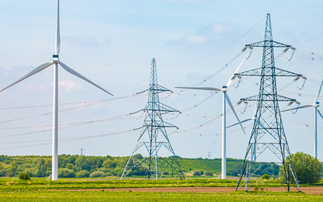The message to business leaders is once again clear: time has been called on the fossil fuel economy and 'those who fail to bet on a green economy will be living in a grey future'
Anyone who has ever found themselves in a pub at closing time knows how it works. The bell goes for last orders and some people leave while others rush to the bar for a final round. A few of those who should probably know better try and sneak in several last orders. Then the bell goes again. And again. And then the landlord yells it is time to drink up - 'time, please. Haven't you lot got homes to go to?' A few more chimes, perhaps a heated exchange or two, and finally the last revellers are kicked out - before the police are called.
The critical outcome of 2015's Paris Summit - more important than the legalese of the final text, the truce between the US and China, or the various welcome funding commitments - was the signal it sent. The dual goal to keep temperature increases well below 2C and build a net zero emission economy this century provided an unequivocal message to investors and businesses. Time was being called on the 20th century's fossil fuelled economy.
In the intervening two years the unanswerable logic of the Paris Agreement has quietly shaped many of the business, investment and policy trends that have steadily accelerated the progress of the green economy.
Multinational giants have flocked to adopt science-based emissions targets and clean energy commitments, acknowledging that clinging to high carbon growth trajectories is loaded with risk. The Financial Stability Board's Taskforce for Climate-related Financial Disclosures (TCFD) has combined with investor pressure to popularise the 'carbon bubble' hypothesis and force listed firms to recognise the wisdom of assessing the immense risks and opportunities associated the 2C goal. Governments such as the UK, Canada, and many others have pledged to phase out coal power and make clean infrastructure and innovation a key component of their economic strategies.
But the reality is you don't call time on a globally embedded economic model and its continent-spanning infrastructure by ringing the bell once. That is why today's One Planet Summit in Paris is so important. Two years to the day after the Paris Agreement was reached it amplifies the pact's core message to investors and business decision-makers: time really has been called on the fossil fuel economy.
There is little doubt that such a clarion call needs to be reissued at ever increasing volume. After Donald Trump's reckless decision to quit the Paris Accord and the dispiriting news global greenhouse gas emissions are set to rise this year, the UN's climate summit last month felt strangely underpowered. Important progress was made towards ensuring the Paris Agreement comes into full effect in 2020 and there was encouragingly little evidence of US-inspired backsliding from other key players. But the absence of many world leaders and the broad failure to forcefully articulate how the Paris goals will play out in the real economy meant the signal to the investment community was more muted than it should.
In contrast, Emmanuel Macron's all-star climate action fiesta brings a loudhailer. And it is absolutely clear who the target audience is: global investors and corporate leaders.
Taken as a whole today's flurry of announcements and speeches, dramatically underscore what the Paris Agreement means for businesses.
It means if you are a listed firm that is amongst the top 100 global emitters, investors with over $26tr of assets under management are going to demand you engage fully with climate risks and assess what a 2C scenario means for your business.
It means over 237 companies with a combined market capitalisation of $6.3tr are already doing precisely this in line with the TCFD recommendations.
It means even companies like ExxonMobil cannot resist investor calls to engage with climate risks indefinitely, and it likely means when the oil giant does produce an assessment of what a 2C trajectory means for its business it will struggle to conclude its current carbon intensive approach is sustainable in the medium to long-term.
It means one of the planet's largest insurers declaring the +4C of warming we could see this century would make the world "uninsurable".
It means many of the world's largest Blue Chips calling for ambitious national and international climate policies, more demanding environmental regulations, and higher carbon prices.
It means governments actively intervening to promote and support strategic low carbon industries such as electric vehicles and clean energy.
It means the OECD leading calls to make climate and environmental considerations a key component of national budget decision-making.
It means a growing number of jurisdictions declaring they will phase out coal power within the decade, and a host of investors saying they will not touch any coal projects that remain.
It means a former US Secretary of State calling for a full blown moratorium on coal investment and the European Commission declaring its "commitment to a clean energy transition is irreversible and non-negotiable".
It means if you have an upstream oil or gas project that needs financing there is no point calling the World Bank.
It all adds up to a palpable sense that the policy, political, public and investment climate for carbon intensive infrastructure has never been more hostile. If this year's Climate Week NY Summit in September highlighted how more and more big businesses are recognising the immense opportunities associated with plummeting clean tech costs and deep decarbonisation programmes, today's One Planet Summit reveals investors and multinationals are more agitated than ever about the risks associated with inaction on climate change.
Inevitably, there is a depressing counter-narrative - after all, it is 2017, the year of the depressing counter narrative.
Global investment levels in clean technologies and low carbon infrastructure still lag far behind where they need to be. Whether it is a blip or not, global greenhouse gas emissions are thought to be heading in a catastrophic direction. The world's largest economy was conspicuously NFId from today's gathering.
The Trump administration's plan for a new 'clean coal' alliance of countries that are willing to defending the continued use of fossil fuels would be more worrying if the White House did not currently resemble a refuge for the pathologically incompetent. But it still threatens to send a counter signal to investors that some governments are willing to throw carbon intensive assets a lifeline.
Too many of the governments that today voiced their support for the Paris Agreement, the UK included, are failing to translate this commitment into sufficiently ambitious low carbon policies and programmes.
Equally, it remains a source of constant frustration for anyone who cares about the future stability and habitability of the global economy that even when the world's foremost political and business leaders orchestrate a media blitz to highlight the urgency of the climate threat many publications and broadcasters continue to purposefully look the other way.
Some of the world's top investors and politicians have basically just declared the business models that have dominated the global economy for over a century will soon be unviable, bordering on toxic. And yet media efforts to inform their readers of this crucial reality remain patchy at best.
But despite these serious caveats you have to ask which signal is the more compelling for the savvy investors and world-leading multinationals that will ultimately determine the pace of global decarbonisation efforts: the one from every government on the planet bar one, the World Bank, top institutional investors, and plummeting clean tech costs; or the one from the few last remaining political and media redoubts of wilfully ignorant, climate sceptic, hard right, hyper-partisan, economic illiteracy?
As UN secretary-general António Guterres argued today, the balance of business risk and opportunity in favour of aggressive climate action has only become more explicit since the Paris Agreement was signed. "Those who fail to bet on a green economy will be living in a grey future," he declared. All today's announcements from investors and policy makers backed him up.
The bell calling time on the high carbon economy rung for the first time at the 2015 Paris Summit. Some people responded and others chose to ignore it. Many of those who responded are now in Paris again today, ringing the bell once more. It is inevitable that more will join them in the future. No doubt, some will continue to ignore the warnings, but the bell is only going to get louder - at the UK's new Zero Emission Transport Summit, at the COP24 Summit in Poland, at the release of Exxon's climate risk disclosure and in the engagements top investors start to make with listed firms around the world. And, of course, it'll keep ringing in Paris, at the site of one of the most important agreements in human history.










